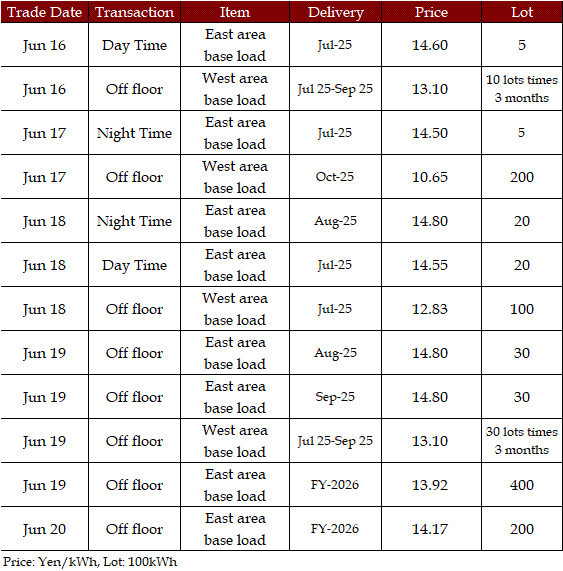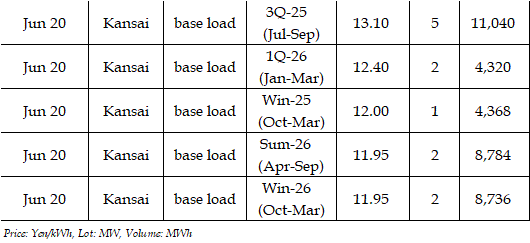|
In the day-ahead market on JEPX (Japan Electric Power Exchange), the 24-hour spot power prices on a weekly average basis for Jun 16-20 delivery extended gains steeply from the previous week in both East Japan (50Hz) and West Japan (60Hz). Severe heat waves gripped the entire Japan, with the highest temperature rising near the extremely-hot day indicator of 35 degrees in some parts of Kanto to Kyushu. Thus, utilization of air-conditioners increased remarkably from the previous week, pushing up the peak demand in Tokyo near 50GW from time to time. With many thermal units still off line for regular maintenance, growing demand boosted buying interest in the spot power market, lifting the intraday high sharply to the Yen 28 level in East Japan and the Yen 30 level in West Japan. By time zones, East Japan frequently outperformed West Japan during midday (08:00-16:00 hours) and night time, but vice versa from evening (16:00-20:00 hours) onward. The contrast mirrored a difference between East Japan and West Japan in power configuration including photovoltaic and nuclear generation.
In Tokyo and Kansai, the key areas in East Japan and West Japan, the 24-hour average posted a difference in favor of the East by Yen 3.64 for Jun 16 delivery, Yen 1.84 for Jun 17 delivery, Yen 0.82 for Jun 19 delivery, Yen 0.82 for Jun 19 delivery, and Yen 1.42 for Jun 20 delivery.
The fuel market trends in the third week of June were detailed as follows.
DES Northeast Asia spot LNG prices strengthened to the mid $13 level per mmBtu for prompt August 2025 arrival as of Jun 19, up about $1.50 from the end of the previous week (Jun 13). Natural gas prices in Europe stretched a rally amid intensifying geopolitical risks in the Middle East, and the LNG market in Northeast Asia followed suit. The Ministry of Economy, Trade and Industry (METI) announced on Jun 18 that Japan's LNG inventories for power generation stood at 2.14 mil mt as of Jun 15, down 200,000mt from a week before. The figure was up both from 2.13 mil mt as of end-June last year and the average of past five years at 2.10 mil mt.
FOB Newcastle thermal coal prices in Australia stood at $107 for June 2025 loading as of Jun 19. The level was up $1.50 from the end of the previous week, in line with firmer crude oil and LNG prices.
In the crude oil market, WTI crude for August 2025 stood in the high $73 level per barrel as of Jun 20 afternoon while Brent crude for August 2025 was trading in the high $76 level. Both WTI and Brent were up about $2.50 from the end of the previous week. Crude futures were bolstered by geopolitical risks in the Middle East amid military conflicts between Israel and Iran. In addition, concerns grew the US would participate in the Israel-Iran war, raising worries that the crude oil market could move into higher territory.
The actual highest price during the week was at Yen 30.56 in West Japan for Jun 19 and Jun 20 delivery. Meanwhile, the actual lowest price during the week was at Yen 0.01 in Chugoku, Shikoku and Kyushu for Jun 16, 19 and 20 delivery.
By area, the weekly average of the 24-hour spot prices was at Yen 11.22 in Hokkaido, up Yen 2.18 from the previous week, Yen 12.02 in Tohoku, up Yen 1.90, Yen 15.03 in Tokyo, up Yen 2.78, Yen 14.17 in Chubu, up Yen 4.03, Yen 13.74 in Hokuriku and Kansai, up Yen 3.79, Yen 10.68 in Chugoku, up Yen 0.81, Yen 10.68 in Shikoku, up Yen 1.75, and Yen 10.68 in Kyushu, up Yen 0.71.
In the JEPX auction, volumes of offers were 1,144.85 mil kWh on a weekly average basis, up 7.9% from the previous week. Meanwhile, bids on a weekly average basis expanded by 16.8% to 1,028.58 mil kWh. The weekly average of trade volumes grew by 14.7% to 804.39 mil kWh.
Power demand in nine areas of Japan during Jun 16-20 was a combined 12,902.16 mil kWh, up 19.1% from 10,833.88 mil kWh during Jun 9-13. The figure was up 13.7% from the corresponding period a year earlier. Demand during Jun 17-21, 2024 after day of week adjustment was 11,344.79 mil kWh.
Deals reported on TOCOM (Tokyo Commodity Exchange) during Jun 16-20 were as below.

Deals reported on EEX (European Energy Exchange) during Jun 16-20 were as below.











In the fourth week of June, spot prices are expected to soften from the third week. The highest temperature is forecast to be around 30 degrees from southern Tohoku to Kyushu throughout the week. Heat waves will be alleviated compared with the third week with extremely hot weather (35 degrees) observed from place to place. Meanwhile, the weather is expected to remain rather cloudy, and a squeeze in solar power supply is believed to serve as a bullish factor. But less sunlight will ease intense heat, so that utilization of air-conditioners is believed to slow down from the third week. In addition, an increasing number of thermal units will come back from regular maintenance, another factor that will put a lid on spot prices. A source at a power producer and supplier pointed out, "Eased heat waves will likely cap upside room in spot prices. But many households began using air-conditioners, and the addiction to air-conditioners will keep demand relatively steady. The temperatures will fall but still stay around 30 degrees, and I doubt if the peak demand in Tokyo will fall below 40GW even on weekdays." The source also noted, "With the weather conditions and temperature trends taken into account, I believe the intraday high in spot prices will still exceed Yen 20 in both East Japan and West Japan. The 24-hour average will be around Yen 15 in Tokyo and Yen 13-14 in Kansai."
|
JEPX: System Price (Day Ahead 24 hours)
|
|
Weekday Price
|
16-Jun
|
17-Jun
|
18-Jun
|
19-Jun
|
20-Jun
|
|
24-Hour Ave
|
8.13
|
8.80
|
8.33
|
10.19
|
10.31
|
|
Volume (MWh)
|
687,669
|
658,443
|
690,330
|
676,307
|
632,584
|
|
(unit: yen per kWh) (date: delivery day)
|
|
|

|